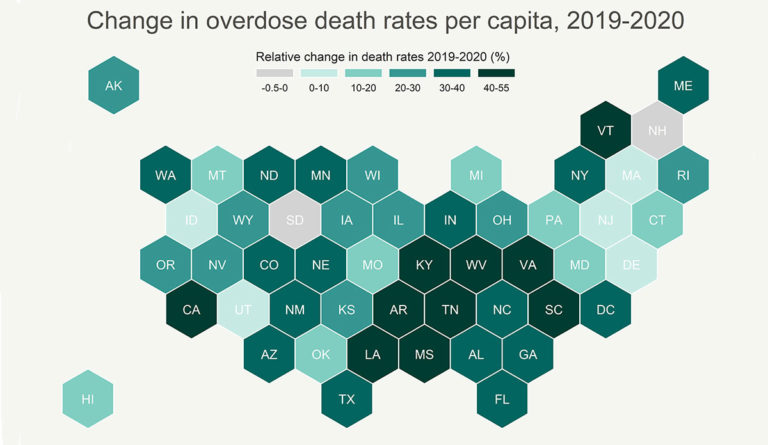A Surge in Overdose Deaths During Covid-19
Almost all states experienced increased rates of fatal drug overdose from 2019 to 2020.

Read Time: 2 minutes
Published:
Americans are tired, frustrated, and burnt-out after two years of living with the pandemic. We are approaching one million deaths that are directly attributable to Covid-19; however, the pandemic’s true toll may be much higher. Drug overdose has been the leading cause of accidental death in the United States for several years, and rates skyrocketed in the first year of the Covid-19 pandemic.
Using data from the Centers for Disease Control and Prevention’s WONDER database, we identified drug overdose deaths from each state from 2013 to 2020. We observed 91,799 drug overdose deaths in 2020, a 29.9% relative increase from 2019 – and the largest annual increase on record.
As the map shows, changes in overdose deaths rates varied substantially state-to-state. Almost all states experienced increased rates of fatal drug overdose from 2019 to 2020, with 26 states experiencing increases upwards of 30%. West Virginia saw the largest relative increase in drug overdose deaths from 2019 to 2020 at 54%.
In contrast, some states escaped relatively unscathed. South Dakota and New Hampshire reported fewer drug overdose deaths in 2020 than during the previous year – a result that warrants further study, especially considering nearby Maine and Vermont were not so lucky.
The pandemic has exposed deep shortfalls in our ability to deliver substance use disorder and harm reduction services during a public health emergency. In many states, access to to harm reduction services, like Naloxone prescriptions or needle exchange programs, are often predicated on in-person visits, which became difficult-to-impossible during the Covid-19 pandemic.
The federal government authorized medical providers to transition administration of medications for opioid use disorder (i.e. buprenorphine/methadone) to telehealth, and many did so. However, telehealth may exacerbate socioeconomic disparities in access to care, as many do not have consistent access to devices capable of accessing the internet. Moreover, this authorization is set to expire when the Covid-19 public health emergency is no longer in effect – though individual states can apply for extensions.
Our early results highlight the need to expand access to overdose reversing medications like Naloxone, and permanently remove administrative barriers to provide and access medication assisted treatment. Immediate policy changes to support access to these lifesaving services are needed to avoid additional, unnecessary loss of human life.
Databyte via Auty S, Griffith K. Medicaid expansion and drug overdose mortality during the Covid-19 pandemic in the United States, Drug and Alcohol Dependence, March 2022.




